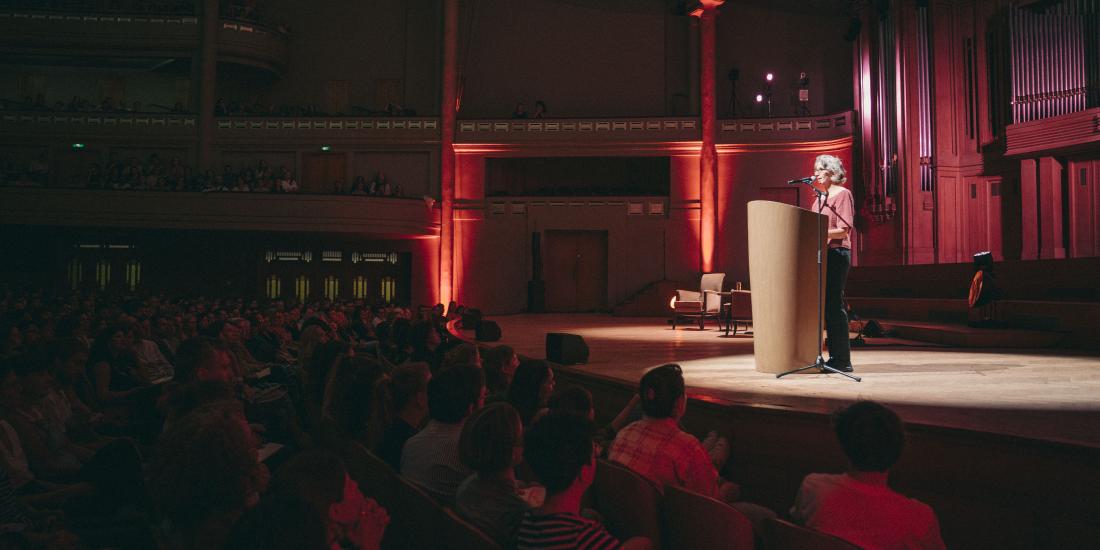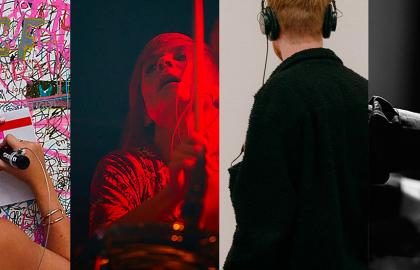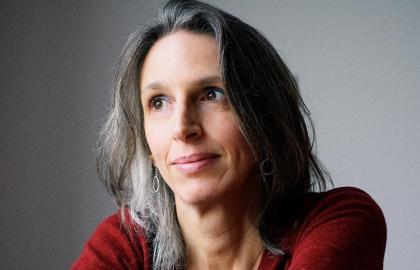It is not one of the best-known slogans from May 68, but it is one that I really like: “Enough actions, words!”
Bozar’s theme for this season, “Dreams and Action”, gives me the opportunity to take stock of this tension between words, dreams, thinking, and what we call action, or reality; a tension that I am confronted with as someone who is constantly in danger of falling down a hole in the road because she is lost in thought; as a person who has been reading books compulsively for almost half a century and who has been writing them for the last twenty years.
What I like about the slogan I have just quoted is the mischievous way it highlights – by turning it on its head – a scale of values implicit in our society: talking is tantamount to chitchat, thinking is intellectual masturbation; only action is noble and has impact, an effect on the world. It is a view I have often encountered, especially in the left-wing and extreme left-wing circles I have frequented. Some of the intellectuals I met expressed a form of despair at the idea they were only intellectuals, that all they were doing was selling paper and preaching to the converted, and that everything they did was absolutely useless, whereas their dream would have been to start a revolution. Their despair was matched by an admiration for the proletariat “man”, he, who was capable of going on strike, seizing the tools of production and bringing big business to its knees – or at least trying to. It seems to me that in the men who said this, their self-deprecation also stemmed from a conviction that this idealized, heroic worker possesses a physical strength and virility that they felt lacking in themselves, as if devoting oneself to thinking and writing was a sissy thing to do, a soft and degenerate bourgeois thing.
Be that as it may, my childhood and youth did not prepare me for hearing intellectual activity disparaged. I had parents who – although they came from families where culture did not play a large role – held a high opinion of intellectual activity and had an immense thirst for it. They took me to the theatre, the opera, and gave me books. I remember the succession of novels on my mother’s bedside table: Out of Africa by Karen Blixen, The Man Without Qualities by Robert Musil, The Magic Mountain by Thomas Mann… I heard her talk about them, and I had the impression that by reading these books, which could last for months, she was going through important, almost mystical experiences that were changing her. It made me want to imitate her, to experience the same revelations, the same disruptions.
The corollary of this is that I grew up with the obscure conviction that artists, writers, and thinkers were kinds of demigods, apart beings. This idolatry resulted in me falling flat on my face when I later realized that great artists could also be utter scum, or quite simply ordinary human beings, with their own weaknesses, pettiness, and contradictions. I was not ready to embrace the complexity of this reality, and the first time I was confronted with it – long before the #metoo movement brought the problem into the public domain by revealing the sexual violence artists are capable of – it hit me quite hard.
In short, I began my life being told that writing, thinking, creating were everything, only to be told later that they were nothing. And today, now that I have achieved my independence from the two families I have just mentioned, my biological family and my political family, perhaps the time has come to ask myself: what do I think at this stage of my life? What have I learned about this?
Firstly, I believe my thinking is conditioned by the fact that words are my only area of expertise. Until now, I have always managed to make a living from them, fortunately so, because I don’t know how to do anything else. And I can’t even reassure myself that this specialization is a guarantee of excellence because it is not. Just because you can’t do anything other than write does not mean you will write better than others. As upsetting as this is for me, there are plenty of authors with a thousand different talents whose writing takes my breath away. It could even be argued that these talents are engaged in a kind of conversation with each other, mutually nourishing and enhancing each other, just like speaking several languages makes it possible to speak all of them better, not worse.
I am acutely aware of all the skills I lack, and I sometimes regret not having a more direct grip on the world. For example, I really appreciate the meals my loved ones prepare for me, and I regret not being able to return the favour. Recently, on a Greek island, I met an Albanian immigrant, a building contractor much sought after for his know-how. He had just bought a piece of land on a hill facing the sea and was preparing to build his house on it. I was very impressed, both because it seemed a slightly less thankless fate than average for an immigrant worker, and because being obsessed with houses myself, how extraordinary it must be to be able to build the house of your dreams with your own hands.
In her correspondence with Leïla Sebbar, published in 1984 under the title Lettres parisiennes, Nancy Huston remarked that the danger for writers was to become like King Midas in Greek mythology, who turns everything he touches to gold and ends up starving to death: when you write, everything you touch becomes words, and “the risk we run”, says Huston, “is no longer being able to directly touch what we need: the beings we care about, the things we hold dear”. I have never forgotten this image.
But neither can I ignore the treasures that writing has showered upon me. I realize how lucky I am to have an activity in life that I am passionate about and in which I want nothing more than to continuously improve. I also owe it to writing that at least once a week, a stranger – normally a woman – lights up my day by smiling at me or stopping me in the street. And it is thanks to writing that, at least at present, I am free from the obligation of salaried work, which I experience as a huge privilege and a fascinating adventure.
For me, intellectual activity is on a par with others, neither above nor below. I have often written books protesting against the mystique of action, which values frenetic agitation and regards every moment of thinking, breathing, rest or withdrawal as a defeat or shameful complacency. Far removed from the cliched image of the heroic, conquering seasoned reporter, I even argued for a form of journalism that looks at the world from the comfort of a couch, a méridienne (chaise longue) – the name I have given to my blog: “La Méridienne”. Our relationship with the world cannot do without this layer of thoughts, reading, daydreams, which enable us to tame it, arrange it, understand it better and therefore live in it better. I consider it an honour to be able to take part in supporting this kind of impalpable, invisible cloud, which is nonetheless so important to me. And I am counting on my lucky stars to prolong this pleasure for as long as possible while continuing to evade all the holes in the road that are trying to claim me.
Mona Chollet


